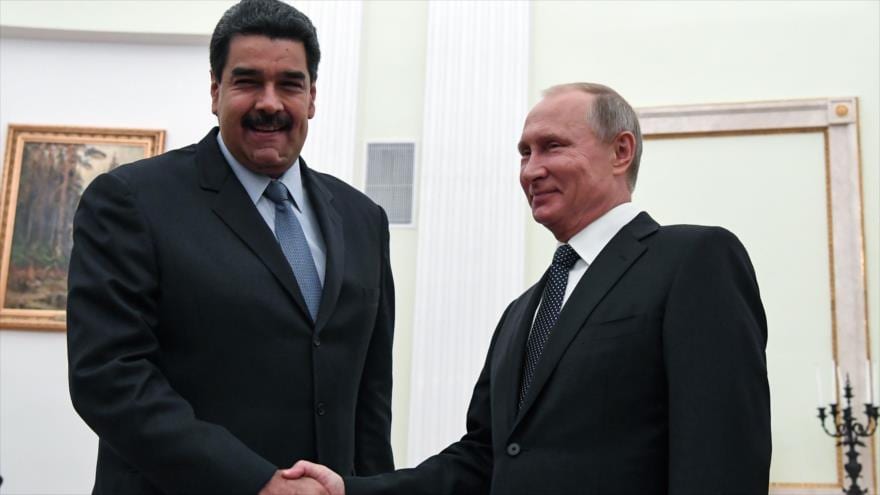Photo: HispanTV
30.10.2017
The past week was marked by the statement of both sides about their willingness to sign an agreement to postpone payments by dividing them into two parts and giving Caracas favorable terms for the first stage of debt repayment.
This news cannot be called sensational – the intention of the Russian Ministry of Finance to reconsider part of Venezuela’s debt obligations of $1 billion was claimed in early October, a few days before the official visit of Venezuelan President Nicolas Maduro to Moscow. Maduro’s stated participation in the Russian Energy Week-2017 was clearly not the main reason for this trip – taking into account the catastrophic situation of the country, which continues to plunge into the abyss of the crisis on the background of political split and economic decline, Maduro’s main goals were realized during a meeting with Vladimir Putin on October 4.
In the light of an inevitable approach of payments on obligations, failure of those threatens the country with a default and a complete cessation of oil production, Maduro’s government desperately needed to postpone other parts of its external debt. The Russian side readily extended Venezuela a helping hand – ten days after the visit of the Venezuelan head of state, Russian Minister of Finance Anton Siluanov announced that the draft agreement has already been prepared: “We have worked out such conditions with the Ministry of Finance. If the Venezuelan side manages to initial these agreements quickly, there is every reason indeed to reach an agreement and sign the conditions for restructuring before the end of this year. ”
The state of the Venezuelan economy did not call for long reflection, and on October 27 both sides made statements that the preliminary conditions for restructuring the debt had been agreed. According to Venezuelan Ambassador to Russia Carlos Rafael Faria Tortosa, a meeting of the intergovernmental commission will be held on November 23-24, where the treaty is to be signed.
The news about successful outcome of Russian-Venezuelan negotiations is significant not so much by its content as by the context: it appeared on a day that had every chance of becoming a Venezuelan “Black Friday”. On October 27, one of two payments for the obligations of the state oil company PDVSA was scheduled, which could not be postponed – in case of failure to pay $842 million, analysts unanimously predicted an announcement of a default at the request of investors. Their forecasts looked extremely plausible in the light of Venezuela’s payments avoiding totaling $586 million only this month, as well as the persistent silence of the PDVSA representatives regarding the planned tranche.
Contrary to expectations, on the appointed day the company announced that it served the debt, “despite the economic war the US is waging against us.” How did the PDVSA find funds for this payment? There is no unequivocal answer to this question, experts suggest that Venezuela had to liquidate part of the gold reserves and skip several previous payments that have a grace period. Some policy space for the company could also be ensured by a bond swap that occurred on October 24, 2016 and allowed to transfer part of payments in the amount of $2.8 billion from 2017 to 2020 (by this time the amount of debt will rise up to $3.4 billion).
Repayment of this large debt of the PDVSA and the decision to restructure the obligations to Russia could mean partial regaining of control of the situation unless a second urgent payment of $1.2 billion was set for November 2, what again inexorably puts Venezuela under a threat of a complete halt to the strategically important oil industry as a result of the company’s collapse.
President Maduro’s efforts to gather funds in addition to the October 27 payment show that the Venezuelan authorities do not give up, otherwise they would have declared the insolvency of the PDVSA as early as October 27. If PDVSA repays this debt on November 2, Caracas will receive a long-awaited respite in an exhausting struggle for survival: the next major payments ($756 million) for the obligations of Venezuela and PDVSA should be made in April 2018.
However, in the long-term perspective, these measures only prolong the agony of the Venezuelan economy: it is obvious that the growth of the “snowball” of debts and the aggravation of the economic crisis cannot be stopped without huge monetary injections from outside and the restoration of political stability. Western financial institutions will not provide assistance to Venezuela while the Maduro government is in power, and the readiness of the few allies of Venezuela to invest in the country at the threshold of a default and a humanitarian catastrophe at their own risk is questionable.
Although debt restructuring is clearly not enough to qualitatively mitigate the debt burden of Venezuela, Russia’s actions can be viewed as an example of a friendly gesture and a far-sighted foreign policy: the reluctance to make concessions to Caracas would only accelerate the collapse of the Venezuelan economy, which would mean a loss of both important consumer of Russian output, mostly arms, and all resources already invested in joint projects.



